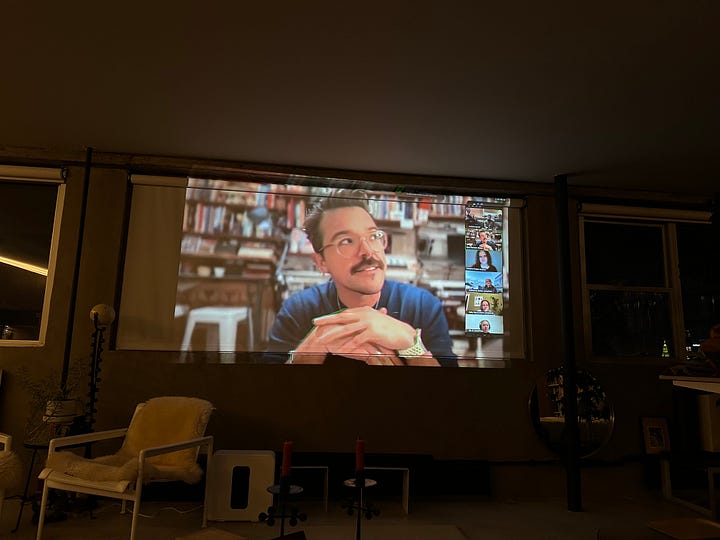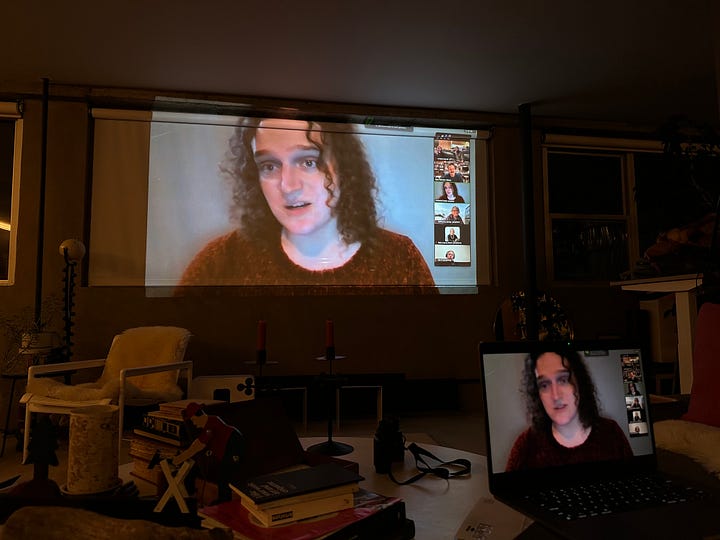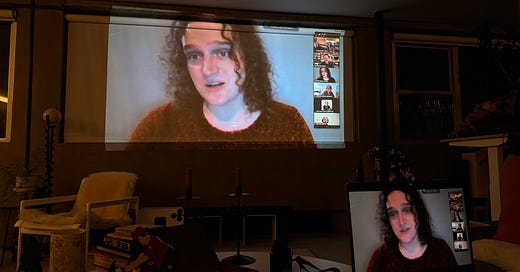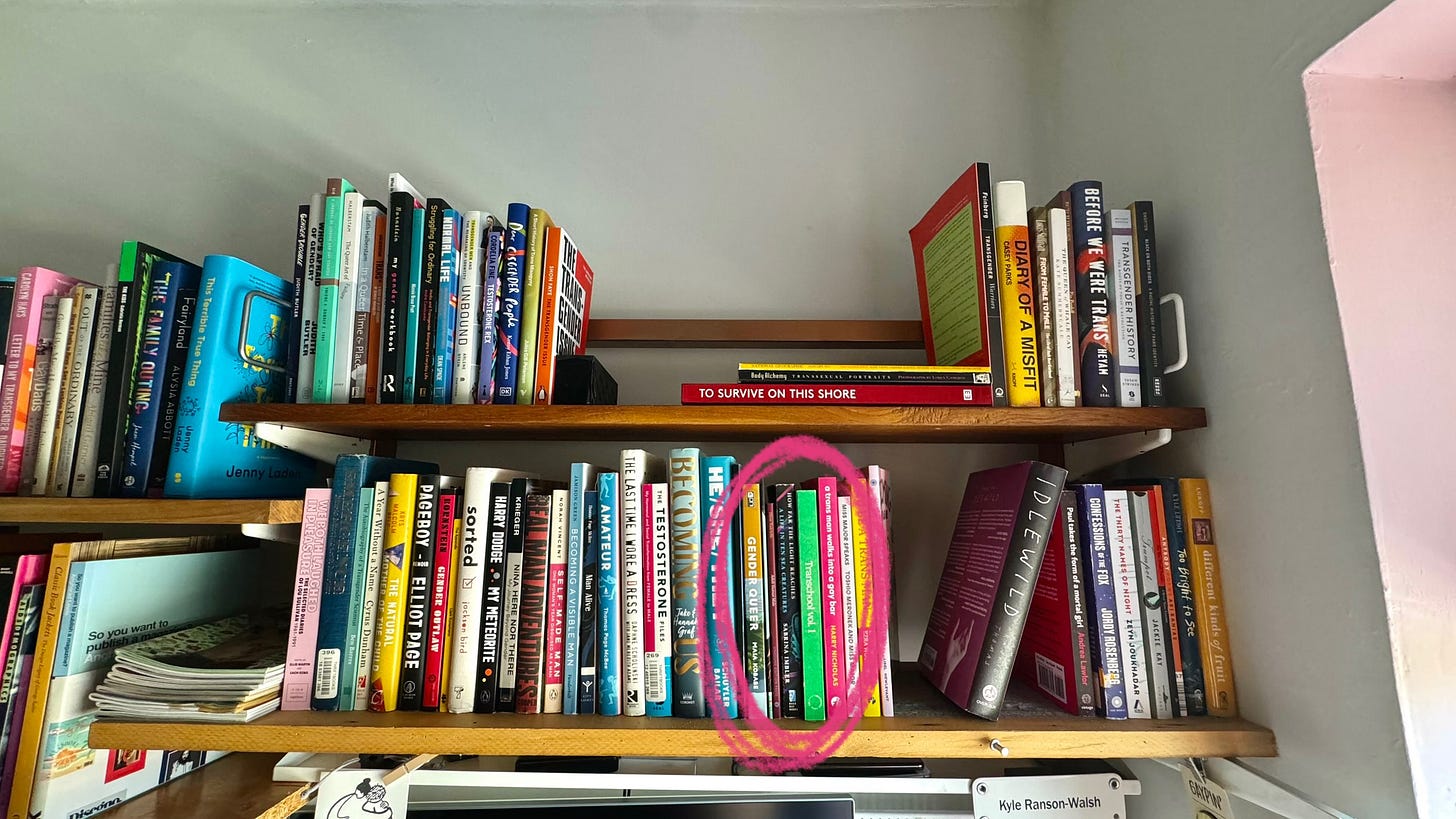"We put our phones down and hold each other."
A conversation with Victoria Foster on the significance of Rep. Sarah McBride and just getting through the week.
What a week. What a month. Bye, January. 👋
I mean, we knew what was coming, but how does one fully prepare for what it will feel like when the entire governmental apparatus puts you in their sights? This administration’s deliberate strategy to flood the zone with harmful, regressive Executive Orders is head-spinning and detrimental to ALL of us.
When Victoria and I met earlier in the month to prep, we couldn’t have known that our Being Alive Book Club gathering discussing Rep. Sarah McBride’s memoir Tomorrow Will Be Different would occur hours after the third EO was signed targeting trans Americans (this was the military one.) Two more would be signed later in the week—taking the current total to five. Well, six if you include “Reforming the Federal Hiring Process and Restoring Merit to Government Service” which slipped in this jab about “one's commitment to the invented concept of ‘gender identity’ over sex.”
I’m not a data scientist, butI did some math: of the 46 EOs signed so far, a whopping 13% focus on gender identity. It’s remarkable how much influence we have over government priorities! And yet, as a reminder, we are less than 1.5% of the population.1
At some point, you have to wipe your tears, stop refreshing the Passport office status page, and laugh at the absurdity of it all.2
The timing of our conversation was fortuitous. Monday night was the exact right moment to be in the community together, and I was very grateful not to feel alone in my apartment.
More than two dozen of you joined, and we raised over $1000 (!!!) for Advocates for Trans Equality, Victoria’s employer and the largest trans organization in the country. A4TE is like our Justice League, a new org born from merging the National Center for Transgender Equality and the Trans Legal Defense and Education Fund. By joining forces, they created a one-stop shop for supporting and defending trans people.
Victoria set up a special link for us to donate to A4TE. We’ll use this throughout the year to continue to raise funds for A4.
I’m so proud of this book club. Truly, this is not hyperbole to say that it got me through this month. Knowing that I had all of you reading along with me gave me something good and positive to focus on. Thank you for all of your comments, chat messages, texts, and emails. And thank you
for volunteering to assist with Zoom tech. ❤️This month, we all learned a little or a lot about Rep. Sarah McBride. Now, I want those of you who could not make our gathering to get to know our first BABC guest, the wonderful Victoria Foster. Below is a selection of our conversation, edited down for easy reading. Thank you, Victoria, for your time, care, and thoughtfulness. When this all started, I didn’t expect to make a new friend.


Kyle: Hello, everybody welcome! My gosh, Victoria, someone is here from Durham! I’m here in Brooklyn, in my studio full of books. I'm so so delighted that you're all here and making this little book club dream come true.
I picked up Sarah’s book after the election—it felt like one thing I could lean into. And then, when I met Victoria at a fundraiser in December, I knew I had met the perfect person to dicuss the book with.
Sarah McBride has already lived a remarkable life. She’s campaigning with the future Governor of Delaware in high school. She comes out as trans at American University and a month later meets her future husband at a White House Pride reception. Later that year, she’s the first trans White House intern. It’s wild how much happened in her life in such a short time.
Victoria, where did you see yourself in Sarah McBride's story?
Victoria: As another white trans woman, there are obvious surface-level connections, but what really stands out is how she's such a political wonk from childhood. I was the same way. I remember that Howard Dean lost the 2004 Democratic primary because he made a weird noise—why do I remember that? I was 9 or 10. I think, to that end, me and Sarah are immensely similar.
There are so many ways in which our lives run parallel, but our paths diverged in critical ways. Like Sarah, I applied to American University—I even got in. But I went to school in Ohio instead, where I came out. While Sarah found acceptance in Delaware and could ascend through political ranks in her state, I had to abandon my roots entirely.
Kyle: I read the book—you listened to the audiobook—do you think that made a difference?
Victoria: Hearing a trans woman narrate her own story for over nine hours was stunning. We rarely hear trans women's voices for that long, without interruption or someone else trying to tell our story. Having that unfiltered voice really impacted me.
Kyle: I was so eager to jump into the book that I forgot to give a bit of grounding of who we are and how we both got here. One of the things we first connected on was being from the South. I was born in Georgia; I grew up in Virginia. My experience coming out as queer, and then coming out as trans, is very much situated in being a Southerner. And I have a lot of family in Delaware.
Victoria: I'm also from the South. I was born and raised in North Carolina. My entire family, outside of my parents, is from West Virginia—both of those states are fraught with transphobia. North Carolina was the center of one of the first big trans fights in this country over bathrooms. I grew up with my parents having a yard sign supporting the ban out front of my house. That made it very clear that I needed to get out. As soon as I came out to my parents, they disowned me. My life and Sarah’s life have similarities, but she still has a relationship with her parents, and I haven’t spoken to my father in 5 years.
The thought of doing what Sarah did—trying to win over Liberal Republicans on trans rights was impossible for me to even conceive. That's the difference between Sarah's experience and mine: where she could put down political roots, I had to uproot my entire life.
Kyle: We might as well just get into it now; what we haven't revealed to everyone else here is that Sarah is a bit of a paradox for some. Victoria, why is Sarah McBride such a complicated figure for the trans community?
Victoria: She's getting hit from both sides—from the right, but also, she’s not fully embraced by parts of the trans community. You made a salient point at dinner, contrasting her with Harvey Milk's ascension as the first openly gay elected official. Harvey grew up as a community activist, gaining trust and being bolstered by his community. Sarah made her own way to Congress through hard work and connections, not because of her community. She has this dual responsibility—representing her constituents while also being the first transgender member of Congress. But, when she refuses to speak up about trans athletes being banned from NCAA sports, that makes many people upset and unable to trust her.
Kyle: How do you see Sarah's evolution from her earlier political organizing to her current position?
Victoria: Her earlier political wins were about more specific protections for trans folks. She was more of an advocate. She went viral by taking mocking protest photos inside bathrooms. But by her mid-30s, she's really shifted her strategy and tone to position herself differently politically.
The Democrats have lost a lot of goodwill with the trans community. People who work in Democratic politics have to earn back trust. Sarah is one of those people. I don't think Sarah can never win people over, but people have high expectations and will hold her to them. Maybe those expectations aren't fair, but we have to understand why people have them.
Kyle: How do you, we, balance the urgency of current trans rights issues with Sarah's long-term political strategy?
Victoria: This is such a debate in our community, do we look long-term or focus on right now? Many trans people are losing access to hormones, losing access to passports, facing unemployment and homelessness. For some, there's a real urgency to fight the system right now because it's really hurting people. Sarah's in Congress; she's more privileged than many in the trans community. At the same time, she's affected by bathroom bans and sports bans just like everyone else. So you'd expect urgency from her too.
If you're involved in tactical discussions, maybe there is truth to playing the long game. At Advocates for Trans Equality, we're working to educate people that trans people aren't dangerous. I believe in that cause, but it's a long view. Some don't want to take the long view. Both opinions hold weight and validity. It's our challenge as leaders to try to hold these positions together.
Kyle: It’s been a real joy to learn more about Sarah and witness her entrance to Congress. I find myself studying all of her press profiles—what she’s wearing, the way she edits her words. She’s so polished as a politician. And yet, all of this is so personal. She’s being attacked by her Congressional colleagues and still able to say, “I’ll extend grace as long as people demonstrate growth.” And, “We have to have permission structures for people to to grow and change.” She comes off as a white, Christian lady with a nice gold pendant. She seems to be performing a particular kind of role.
Victoria: That kind of meticulousness is endemic to trans womanhood. Trans women have to self-examine our voice, our posture. Are we taking up too much space? Are we too tall? What culture tells trans women is that every aspect of you— you may never know which one—could give away that you are transgender, and you need to meticulously piece apart yourself to figure out what that is, for your own safety.
Kyle: This feels like poster child syndrome. I was in the New York Times when I was 11, interviewed about having a gay dad. I spent all of my teenage years trying to be this perfect model of what it means to be a kid of a gay parent, and I burned out at 24.
Victoria: No matter what—if it's attacks on gay marriage, gay parenthood, if it's attacks on transness—it feels like all our defenses revolve around just proving our own innocence. It is innocent to be a gay parent. It is innocent for me to transition. It is innocent for me to use the women's restroom. There is no demonstrable harm being done anywhere here.
Kyle: I feel for her—she's set herself up in such a hard spot. There’s a moment in her interview with David Remnick3 when he plays AOC’s fiery response to the bathroom regulations in Congress and Sarah says, “There’s room for a diversity of messages and a diversity of messengers.” I thought, “That’s the most fucking political answer I’ve ever heard.” But, it’s also kind of brilliant.
The thing I love about Sarah is that she is opening the aperture for what it means to be trans. I mean, think about it, how many famous trans people can any of you name? Now take away the actors.
Victoria: I wish that she still had Andy to advise her. We haven't even gotten into the Andy of it all—easily the most heartbreaking aspect of this book for me. I've been in love with a trans woman for over 6 years now. We've been in a loving relationship, and we plan to get married this year while we still can, knock on wood. The idea that she could be taken from me before we can grow old together, to the degree that Andy was taken away from Sarah... I cannot think about it in depth, though I still think about it every day, because my partner is a Black trans woman, and the life expectancy for Black trans women is in the thirties in the United States. Thirties, folks. And my girlfriend is currently 28. I wish that Andy was still here, and I wish that she still had him.
Kyle: Yeah, I think there's a reason I've been avoiding that whole part of her story. I hear my brother asking in the chat what else resonated with us in the book. It’s the anniversary of our Dad dying this week, and I just can’t talk about people dying of cancer right now. I’m trying not to think about it.
As you described earlier, every trans person does a lot of mental math every day. Am I standing too tall? Am I too short? Did I open the door wrong? Did I follow that gender rule? Did I say too much? Did I say not enough? It's a running track in our heads all day. I think that is true about love, too. We all worry, “Will someone love me?”
Victoria: Trans futures can be so hard to imagine sometimes. But transness also gives you such hope for the future. I remember when I first started transitioning, the biggest thing for me was that I had something to look forward to. My hair is going to grow longer, my skin is going to get softer. I'm going to change my name, change my gender marker. It gave me a vision of a future that I never had before.
Trans love—trans for trans love—is about how we imagine futures together. We wake up next to each other, open our phones to the worst news you could possibly imagine, and we put our phones down and hold each other, because that is literally the only thing that we can do in those moments.
Kyle: Oof. Looking ahead, what do you think comes next for Sarah?
Victoria: Nobody knows how she's actually going to govern. That is the big sticking point. What will her voting record be? What will she stand for? While I lament that she won't speak up against the anti-trans sports bill, I know she's not going to vote in favor of it. She's going to be a voting member of Congress for years. We’ll be able to look back and actually assess what this woman has done, as opposed to these superfluous judgments of character. I have hope that she's going to surprise a lot of people. I really do.
Kyle: I think that's a great place to start to wind things down. Victoria, it has just been such a pleasure to get to know you. I look forward to more time together. Thank you all for coming.
Next… we’re going under the sea.
This month, the Being Alive Book Club is reading How Far the Light Reaches by Sabrina Imbler. A very, very different kind of memoir. I will send out an email with more information and Zoom registration link this weekend.
xx Kyle
Williams Institute: How Many Adults and Youth Identify as Transgender in the United States?
It’s ridiculous. Especially when you realize that so much of this is fueled by parents disappointed in their children. See: Elon’s treatment of his daughter.






Thank you for the evening and experience ❤️